Hong Kong stocks begin to beat Chinese shares after languishing for a year as underdogs
- The Hang Seng Index, down 6 per cent in the first quarter, fell less than Shanghai’s 10.6 per cent drop, and performed better than Shenzhen’s 18.4 per cent plunge
- Hong Kong’s market may outrun Shanghai and Shenzhen for the first time in a year, as the Hang Seng’s 20 per cent rise since March 15 puts it back in bull-market territory

Hong Kong’s stocks have started to outperform shares traded in China’s onshore exchanges in Shanghai and Shenzhen after a year as underdogs, as corporate buy-backs and beaten-down valuations attracted bargain hunters to Asia’s fourth-largest capital market,
The Hang Seng Index, down 6 per cent in the first quarter, declined less than the 10.6 per cent drop in the Shanghai Composite Index, and performed better than the 18.4 per cent plunge in the Shenzhen Component Index over the same period.
Hong Kong’s market is in the position to outrun Shanghai and Shenzhen for the first time in a year, as the Hang Seng’s 20 per cent rise from its March 15 low puts it technically back in bull-market territory.
The run-up in Hong Kong reflects the resilience among investors after weathering more than a year of China’s regulatory clampdown on technology stocks. The 66-stock Hang Seng is the world’s second-cheapest major benchmark in price-earnings terms after the Ibovespa index on Brazil’s Sao Paulo exchange, according to Bloomberg’s data.
“That’s an opportunity for long-term allocations, given the low valuation and the policy support,” said Dong Yi, an analyst at Shenwan Hongyuan Group in Shanghai.
